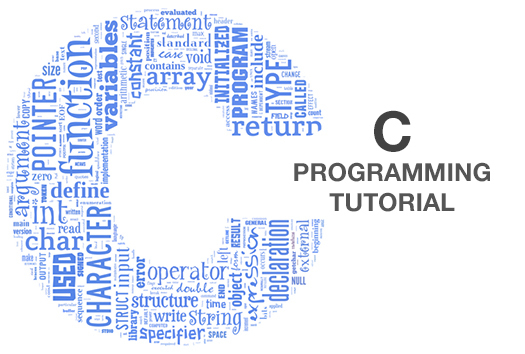<stdio.h> -> defining I/O routines
<string.h> -> defining string manipulation routines
<math.h> -> defining mathematical routines
<stdlib.h> -> defining number conversion, storage allocation
and similar tasks
<stdarg.h> -> defining libraries to handle routines with variable
numbers of arguments
<time.h> -> defining time-manipulation routines
To find out more about there header files and the functions they contain you can either by
a book about C or visit our Other Resources. In addtion to
those header files, we can of course make our own functions and header files.
A function has the following layout: return-type function-name ( argument-list-if-necessary )
{
...local-declarations...
...statements...
return return-value;
}
If return-type is omitted, C defaults to int. The
return-value must be of the declared type.
A function may simply perform a task without returning any value, in which
case it has the following layout: void function-name ( argument-list-if-necessary )
{
...local-declarations...
...statements...
}
Arguments are always passed by value in C function calls. This means
that local ``copies'' of the values of the arguments are passed to the routines.
Any change made to the arguments internally in the function are made only to the
local copies of the arguments. In order to change (or define) an argument in the
argument list, this argument must be passed as an address, thereby forcing C to
change the ``real'' argument in the calling routine.
As an example, consider exchanging two numbers between variables. First let's
illustrate what happen if the variables are passed by value:
#include <stdio.h>
void exchange(int a, int b);
void main()
{ /* WRONG CODE */
int a, b;
a = 5;
b = 7;
printf("From main: a = %d, b = %d\n", a, b);
exchange(a, b);
printf("Back in main: ");
printf("a = %d, b = %d\n", a, b);
}
void exchange(int a, int b)
{
int temp;
temp = a;
a = b;
b = temp;
printf(" From function exchange: ");
printf("a = %d, b = %d\n", a, b);
}
Run this code and observe that a and b are NOT
exchanged! Only the copies of the arguments are exchanged. The RIGHT way to do
this is of course to use pointers. Also note that in the above code how the function
exchange was prototyped. It was declared with a semicolon, and ZERO statements before the main
function. This is called forward declaration. This allows the C Compiler to compile main, without
not yet knowing the code for exchange. All it needs to know is what exchange arguments look like. This way
we can put the exchange function after our main function. We could have easily put exchange before
main and gotten rid of the declaration. The next code segment will fix exchange to use pointers, and move exchange above
main to eliminate the need for the forward declaration.
#include <stdio.h>
void exchange ( int *a, int *b )
{
int temp;
temp = *a;
*a = *b;
*b = temp;
printf(" From function exchange: ");
printf("a = %d, b = %d\n", *a, *b);
}
void main()
{ /* RIGHT CODE */
int a, b;
a = 5;
b = 7;
printf("From main: a = %d, b = %d\n", a, b);
exchange(&a, &b);
printf("Back in main: ");
printf("a = %d, b = %d\n", a, b);
}The rule of thumb here is that
- You use regular variables if the function does not change the values of
those arguments
- You MUST use pointers if the function changes the values of those
arguments
Lastly, I noticed that none of the examples with functions have returned values. So this quick
example will illustrate returning values with functions. Functions may not seem that useful yet,
but as your program grows you will no longer want to have all your code in main. So you will
want to split it up into functions. Below we have a function that adds the two arguments it
receives and returns their value. Not to complex, but does its job well. Take a look:#include <stdio.h>
int addints(int a, int b)
{
return a+b;
}
void main()
{
int a;
int b;
int sum;
a = 6;
b = 7;
sum = addints(a, b);
printf("The sum of a and b is : %d\n", sum);
}
|
